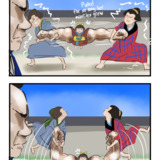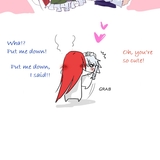Faits accomplis over a hundred years old are terribly irrelevant for people seeking better future prospects in life than offered by their only too often presently drought-stricken, war-torn and/or crime-ridden (etc. etc.) homelands tho.
Chronic and willful ignorance about any number of things is certainly one of the major problems with the US, but that's what happens when the cultural mindset is actively hostile to investing the resources of the state into the betterment of the populace and society (OH NOES COMMUNISMS) and critical self-reflection (Y U H8 FREEDUM). One result of which is that it's increasingly dependent on importing educated and intellectually developed workforce because so much of the potential of the native population is outright wasted through a chronic unwillingness to invest resources in developing it. Which obviously doesn't bode well in the long run.
to the fact that the bombings of Hiroshima and Nagasaki are not classified a war crime, despite the fact that a 1946 military investigation shows that Japan would've surrendered by November 1945 at the latest with zero aggression required
Uh, yeah, no. Strategic bombing was not a war crime, it was an universally accepted weapon everyone used to the extent their resources (in practice airforce makeups) allowed those days. It was certainly horribly inefficient in achieving its actual stated goals and based on seriously flawed theories and assumptions but that only became apparent in hindsight (which is a major reason pinpoint surgical accuracy became a major airpower developement goal thereafter).
And during the war Allies had basically zero human intelligence on Japan - by '45 the last Soviet spy networks on the ground were long since destroyed. They had to make their projections based on observations of Japanese military behaviour on the ground (ie. a consistent disregard of pretty much even the most basic laws and customs of war and fanatical willingness to fight to the death) and shocking incidents like the mass suicides of civilians during the Battle of Okinawa, which is what informed the extremely grim preliminary estimates for Operation Downfall.
Which was actually exactly what the Japanese high command intended; they were hoping that the apparent greater willingness of their troops and subjects to die would deter a final invasion on the as-such entirely accurate assumption the Democracies were altogether more sensitive to casualties than themselves. (Not that it took much; the mangaka Shigeru Mizuki, who lost an arm to an Allied air raid in Papua New Guinea, opined in an autobiographical work that the military's "contempt for death had perverted into contempt for life".)
In practice the Home Isles were being starved out and destroyed from the air already with entirely conventional weapons and the mood of the populace was such that the (very unpleasant) secret police were getting seriously worried about the possibility of a popular uprising; but the Allies had no way of knowing this at the time and quite understandably had zero desire to play further masochistic death-cult games with the ultranationalist nutters still in charge.
The Bombs, as it happens, did indeed have the desired effect - they completely discredited the deterrence argument of the fight-to-last hardliners (the second one dispelled any straw-grasping delusional hopes of the weapon somehow being an unique one-use affair) and allowed the moderates of the regime to actually sue for peace. Which in turn averted the unknowable but doubtless absolutely horrendous loss of life that would have accompanied Downfall - which, for the record, among other fun stuff envisaged large-scale use of chemical weapons as the Allies knew from signals intelligence the Japanese would be in no position to retaliate in kind (which as everyone had realised after the Great War was the only situation where using those things actually made any sense).




